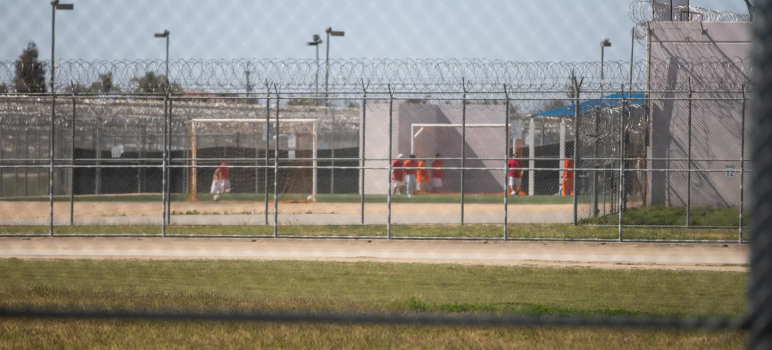A new report from the California Department of Justice finds that immigration detention facilities across the state continue to fall short in providing basic mental health care, with gaps in suicide prevention and treatment, recordkeeping, and use of force incidents against mentally ill detainees.
The report’s release today coincides with an aggressive expansion of immigration enforcement and broader changes to immigration policy under President Donald Trump’s second administration. The timing of the report’s release signals California officials plan to continue oversight as federal officials move to expand immigration detention capacity in the state.
It flagged that California’s detainee population has grown since the state’s last review: more than 3,100 people were held in immigration detention statewide as of April 16, up from the daily average of about 1,750 in 2021, the report found. About 75% of those detained had no documented criminal history.
Investigators with the state’s Department of Justice inspected all six active immigration facilities in California. The inspections were conducted under a 2017 state law that mandated the Attorney General’s office review and report on immigration detention facilities operating in California. It’s the fourth report to be released on conditions in facilities where noncitizens are detained in California by federal Immigration and Customs Enforcement authorities.
The findings come amid broader concerns about federal oversight: the report notes that the federal Department of Homeland Security recently moved to shutter internal offices tasked with investigating civil rights complaints and detention conditions. Last week, the homeland security department quietly removed more than 100 civil rights and civil liberties records from its website, sparking concerns about transparency and accountability in immigration enforcement.
“California’s facility reviews remain especially critical in light of efforts by the Trump Administration to both eliminate oversight of conditions at immigration detention facilities and increase its inhumane campaign of mass immigration enforcement, potentially exacerbating critical issues already present in these facilities by packing them with more people,” said Attorney General Rob Bonta.
The 165-page report details conditions at privately operated facilities where federal immigration officials detain people facing deportation. State investigators found “deficiencies in suicide prevention and intervention strategies” at every site, including missed mental health screenings and improper clinical decisions about when to release detainees from suicide watch.
Staffing shortages, poor coordination between medical and mental health care providers, and widespread problems with record-keeping contributed to the risks for detainees, many of whom suffer from depression, anxiety, and post-traumatic stress disorder, according to the report.
Conditions that can worsen mental health, such as solitary confinement, remain common, the report found. At facilities known as Desert View Annex, Imperial, and Otay Mesa, investigators found that force was disproportionately used against individuals with mental health conditions, including cases where chemical agents were deployed. At the Mesa Verde facility in Bakersfield, officials failed to properly document or report the forced transfer of detainees who had participated in a peaceful hunger strike, the report said.
Despite federal guidelines discouraging the isolation of detainees with mental illness, the California review found people with serious mental health conditions were routinely placed in segregation, sometimes for months at a time. Investigators found some facilities failed to properly inform detainees about protections under a federal court settlement that requires legal representation for people with severe mental health disorders.
Pat-down policies at the Mesa Verde center discouraged detainees from seeking health care, the review found. Detainees reported feeling that invasive searches deterred them from attending medical appointments or accessing other services.
Christopher V. Ferreira, spokesperson for Geo Group, the private company that operates several of the facilities, in a written statement said the company “strongly disagrees with these baseless allegations, which are part of a long-standing, politically motivated, and radical campaign to abolish ICE and end federal immigration detention by attacking the federal government’s immigration facility contractors.”
“This report by the California attorney general is an unfortunate example of a politicized campaign by open borders politicians to interfere with the federal government’s efforts to arrest, detain, and deport dangerous criminal illegal aliens in accordance with established federal law,” Ferreira wrote.
Alexandra Wilkes, spokesperson for a trade association that represents Geo Group and three other companies that operate private detention facilities, in a written statement said the contractors have worked “to enhance the conditions for individuals navigating immigration processes” over several decades.
“These improvements include safe and dignified care within modern, purpose-built facilities that offer in-house healthcare services, access to the U.S. legal system, immigrant-rights advocates, religious services, recreation, and more,” wrote Wilkes of the organization called the Day 1 Alliance.
ICE did not respond to a request for comment.
Wendy Fry is a reporter with CalMatters.


If they’re deported, they won’t be detained here. So the supposed problem posited by this article, literally, goes away. The solution is expedited processing, which for political reasons the federal judiciary is lawlessly impeding.
I don’t remember reading on here about concern for the mental health of actual Americans in solitary confinement, in hospital rooms or nursing homes, denied access to loved ones, during Covid lockdowns. The sudden supposed concern for the mental health of people here illegally therefore seems disingenuous.
This report is just confusing on so many levels. They call out the detention centers while the state of CA has 180,000+ people living on the streets, and many of them are unsheltetered, mentally ill and addicted to drugs. Thousands dying on the streets annually – hundreds here in Santa Clara County alone. Where is the investigation and accountability there? Where are the protesters angry about that issue?
CalMatters keeps telling us they aren’t partisan……..